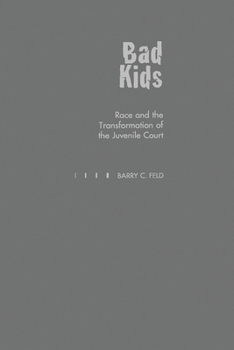Studies in Crime and Public Policy
Select Format
Select Condition 
Book Overview
Within the past three decades, social and legal changes have transformed the juvenile court from a nominally rehabilitative welfare agency into a second-class criminal court for young offenders. Recent efforts to "toughen" juvenile justice policies have resulted in increasingly harsh sanctions that fall disproportionately on minority youths. In this provocative new book, Barry Feld examines what went wrong with the juvenile court and proposes an alternative model for youth crime control and child welfare. The Progressive reformers who created the juvenile court a century ago saw children as relatively blameless and innocent. But recent decades of rising crime rates associated with urban decay have strained this tolerant view of young offenders. Feld relates the 1967 Supreme Court decision In re Gault to the broader social and legal changes associated with the civil rights movement and the Warren Court's "Due Process Revolution." Although gault mandated more elaborate procedural safeguards in delinquency hearings, ironically, those protections legitimated the imposition of more punitive sanctions. Since Gault, Feld argues, three decades of judicial, legislative, and administrative reforms have conducted a form of "criminological triage." At the "soft end," reforms have shifted noncriminal status offenders, primarily female and white, out of the juvenile justice system into a "hidden system" made up of private sector mental health and chemical dependency facilities. At the "hard end," states transfer increasing numbers of young offenders, disproportionately minorities, to criminal court for prosecution as adults. Meanwhile, juvenile courts punish more severely those delinquents-again disproportionately minorities-who remain within the increasingly criminalized juvenile justice system. Feld attributes the current state of affairs to a conceptual flaw inherent in the juvenile court. The juvenile justice system attempts to combine social welfare and social control functions in one organization, but inevitably fulfills both missions badly because of the inherent and irreconcilable contradictions between them. Progressive reformers situated the juvenile court on a number of cultural, legal, and criminological fault lines, where the ideas of child and adult, determinism and free will, immature and responsible, treatment and punishment collide. The past three decades have witnessed a shift from the former to the latter of these binary pairs in response to the racial transformation of cities, the increase in serious youth crime, and the erosion of the rehabilitative assumptions of the juvenile court. The solution, Feld argues, is to uncouple social welfare from criminal social control. States could try all offenders in one integrated criminal justice system with appropriate modifications to accommodate the youthfulness of younger defendants: a graduated, age-culpability sentencing system, separate youth correctional facilities, and the like. Formally recognizing youthfulness as a mitigating factor would provide youths with greater protections and justice than they currently receive in either the juvenile or criminal justice systems. At the same time such a strategy would enable public policies to address directly the social welfare needs of all young people.
Format:Paperback
Language:English
ISBN:0195097882
ISBN13:9780195097887
Release Date:March 1999
Publisher:Oxford University Press
Length:392 Pages
Weight:1.34 lbs.
Dimensions:1.1" x 6.1" x 9.2"
Related Subjects
Children's Books Courts Criminal Law Criminal Procedure Criminology Discrimination & Racism Jurisprudence Law Legal Theory & Systems Minority Studies Philosophy Politics & Social Sciences Race Relations Rules & Procedures Social Issues Social Science Social Sciences Sociology Specific Demographics Teen & Young AdultCustomer Reviews
4 ratings
Bad Kids: Race and the Transformation of the Juvenile Court
Published by Thriftbooks.com User , 15 years ago
Bad Kids: Race and the Transformation of the Juvenile Court (Studies in Crime and Public Policy) I appreciated the fact that Mr. Feld's approach to his study included a child development theory base! The condition and delivery of the book was quick and secure. Thank you from a first time user.
One of the Best Recent Books on Juvenile Justice
Published by Thriftbooks.com User , 23 years ago
Feld is one of the most informed scholars of the juvenile court working today. This book is a tremendous resource for anyone who wants to understand the contemporary juvenile court system as well as the current controversy about the court's responsibility for young offenders. His conclusion, that the juvenile court's delinquency jurisdiction is not only constitutionally suspect but also unworkable in today's policy climate, disturbs those who instinctively defend the system. Once you read his book, however, his arguments are difficult to dismiss so easily.
Bad Kids Raises Provocative and Timely Policy Issues
Published by Thriftbooks.com User , 23 years ago
Barry Feld's "Bad Kids" raises provocative and timely policy issues concerning American juvenile justice at the turn of the century. More than most researchers, he has kept two issues front and center: (1) the contradictions and failings of the juvenile court, and (2) the role of race in driving juvenile justice policy and practice. There are few resources available that address these issues adequately, much less that place them within a broader historical, legal, and sociological context. His primary policy focus is on abolishment of the juvenile court, but many of his arguments can be used to develop and defend modifications, rather than wholesale elimination, of juvenile justice systems. For this reason alone it is a must read for proponents of juvenile justice.
An excellent author, who knows kids better then themselves!
Published by Thriftbooks.com User , 25 years ago
A top quality book on juvenile crime. A MUST READ ! Provides you with insight into things never before imagined!!! BUY THIS BOOK! -Robert Daniels, San Diego, CA





